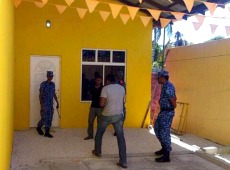Additional reporting by Mohamed Naahii and Ahmed Naish
With two months remaining before the Maldives’ second multi-party presidential elections, former President Mohamed Nasheed, the current Maldivian Democratic Party (MDP) presidential candidate, has alleged that police are plotting to ruin the polls under instruction from Police Commissioner Abdulla Riyaz.
Nasheed, who won the Maldives’ first democratic election in 2008, made the allegations during an MDP rally held in the Galolhu ward of Male’ on Sunday night (June 29).
Attempts to influence the polls by the Maldives Police Service (MPS) were one among “a few concerns”, said Nasheed.
During a press conference held today (July 1), Nasheed emphasised his concerns about police influencing September’s presidential election results.
“We are revealing these possible issues only with the hope that the elections commission would take adequate measures to resolve them. The [Elections] Commissioner should only allow police and military officers [in polling places] after discussing with the candidates’ agents and receiving their consent,” Nasheed stated.
“Police should not be able to enter the polling station without an informed decision made unanimously with the elections commission members and agents of the candidates present at the polling station,” he continued.
“MDP members will not allow police or military to go inside polling stations unlawfully,” he added.
Speaking at the rally entitled “People of Galolhu with President Nasheed” on Sunday, the former president stressed that he was strongly convinced that no one could tamper with the election results, and said to ensure elections are free and fair MDP will have more than 1,900 of its own observers at the polling stations.
“According to information I am getting, Abdulla Riyaz is instructing police officers to barge into polling stations upon his signal, after two individuals enter and create a scene. The remedy to this is that we will ensure no police officer can enter the polling station unless approved by the elections commission,” Nasheed declared.
“This is how it is practiced in other places around the world. Police cannot just enter polling stations. Only the voter and elections officials are allowed. That is why, even a Special Operations (SO) police officer cannot go into a voting station on a whim,” said Nasheed.
The second method by which the police will attempt to ruin the elections is intervening during the vote counting process, after claiming that difficulties are being experienced, such as the election being “rigged”, Nasheed alleged.
The former President reiterated he was confident he would win the election from the first round, predicting that his party would secure 56-57 percent of the popular vote.
“Based on the figures received during the party’s door to door campaign, we are currently able to secure 56 to 57 percent of the voters. From Galolhu, figures indicate MDP getting 73 percent of the vote. We are getting full support from other wards of Male’ as well,” he said.
The Elections Commission outlined some of the key regulations related to concerns regarding police interference with elections.
“Police cannot stand within a 100 foot radius of the ballot box,” Elections Commission President Fuad Thaufeeq confirmed to Minivan News today.
“Police can enter the area only if the Head of Polling Station requests their assistance to control any criminal activity that goes beyond his control,” he continued.
“The role of the police will be to assist the Elections Commission in keeping peace and public safety,” he added.
SO begin MDP arrests on Thinadhoo
Meanwhile, SO police officers have arrested MDP supporters on Thinadhoo Island in Gaafu Dhaal Atoll for allegedly “creating unrest” during President Mohamed Waheed Hassan Manik’s visit to the island earlier in June, according to social media reports and photographs.
 “They started arresting MDP supporters today, at least three people so far,” a source from Thinadhoo told Minivan News today on condition of anonymity.
“They started arresting MDP supporters today, at least three people so far,” a source from Thinadhoo told Minivan News today on condition of anonymity.
The Maldives Police Service (MPS) decided to station officers of the Special Operations (SO) command on Thinadhoo last week. According to local media, the SO officers will work with the Thinadhoo police station to establish “peace and security”.
The Maldives Police Service had not responded to Minivan News enquiries at time of press.
Police reserve force
President Waheed inaugurated the police special constabulary reserve force at a ceremony today.
The MPS announced plans for recruitment of officers for the special constabulary in May this year, with the new officers to be paid 85 percent of the salary of a regular police officer of the same rank.
At the function, 43 recruits from the first batch were presented documents of employment by President Waheed, after which they were sworn-in as police officers at an oath-taking ceremony.
The oath was administered by Criminal Court Chief Judge Abdulla Mohamed. According to police media, the judge advised the news officers on the importance of respecting oaths.
On June 23, police made an announcement seeking 75 “civil assistants” as non-uniformed personnel for administrative work.
Correction: The previous version of this article said Maldives Police Service officers cannot stand within a 100 metre radius ballot boxes, however it should have read 100 foot radius. Minivan News regrets the error.